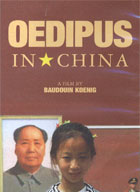
Œdipe en Chine = Oedipus in China 2008
Distributed by Icarus Films, 32 Court St., 21st Floor, Brooklyn, NY 11201; 800-876-1710
Produced by ARTE France and Les Films du Bosco
Directed by Baudouin Koenig
DVD, color, 52 min.
College - Adult
Asian Studies, Psychology, Health Sciences, Human Rights, Education, Social Work, Political, Science, Parenting
Date Entered: 02/11/2011
Reviewed by Maureen Donovan, The Ohio State UniversityThe documentary film, Oedipus in China, which was produced for the Franco-German TV network ARTE.tv and directed by independent filmmaker Baudoin Koenig, provides a window on mental health challenges resulting from China's rapid development and introduces approaches being taken, with an emphasis on psychoanalysis. Narrated in French, the film includes dialog in French, German, Chinese and English (with English subtitles).
Using high quality cinematography and sophisticated video and audio editing, the film moves seamlessly from urban to rural scenes and into offices of professors or clinicians, hospitals, institutes, schools, and clinics. The wide variety of settings contributes both positively and negatively to the film. On the one hand, a great deal of information is presented in that way, with several individual case studies shown in context. On the other, given the complex subject matter being presented, it produces a sense of information overload. This reviewer watched the film twice just to grasp the transitions from one place to another.
The film starts at a "help line call center," where we learn that the destabilization of society is producing widespread feelings of anxiety or depression -- to the extent that the help line worker describes these as having become "fashionable." The film then asks, "Why this infatuation?"
The so-called "Chinese Freud," Professor Huo Datong of Chengdu University in Sichuan, who established the field of psychoanalysis in China is called upon to address this. Huo studied psychoanalysis in France, and now trains his students using theories of Freud and Lacan as tools for understanding relationships and helping people deal with the conflicts in their lives.
We also meet Dr. Zhang Tianbu whose approaches to treatment incorporate Buddhist influences, such as the practice of repeatedly asking the same question several times which was used in meditative practices of the Chan school.
Oedipus in China introduces the work of some European specialists in psychoanalysis who have been coming to China. One of them observes that at first he wondered about the wisdom of introducing psychoanalysis to China at this time, since they have many issues confronting them, but he became convinced of its value for them when he realized that their patients face the same conflicts and problems that he sees in Europe, with only superficial differences.
The film includes visualizations of patients' dreams, with one patient commenting that a calm life can hide contradictions, and another saying that the strange things she sees in dreams are inspirations for her works of art. Early in the film a bicyclist rides through the Chinese countryside carrying h a huge red banner with the Chinese character for "dream" on it. These sequences are interspersed among interviews and visits to clinics, hospitals and schools.
One of the major challenges Chinese mental health specialists face is treating patients who experienced the Cultural Revolution in which the old social system was uprooted and individuals’ ideas were repressed. A sequence in the film shows people having their photographs taken in front of the large painting of Mao Zedong in Tienanmen Square. Huo Datong discusses how Mao stripped fathers of their authority in the family. The one-child family also added to that. Parents are competing with each other for the child's love, while the child becomes a "little emperor" in the family. Without any siblings, these children are surrounded by adults all day.
The one-child family is a special problem in the case of families with disabled children, since parents cannot count on the child to care for them in their (and their parents') old age. At a center for autistic children, a woman talks about having seriously considered suicide. A French psychoanalyst comments that parents need help, not only the children. He also mentions that as many as 75% of the children are not really autistic. In Europe or America these children would receive some other kind of treatment and learn how to function in society.
The film ends with Professor Huo discussing psychoanalysis as providing a sense of freedom, a time when one can talk openly. However, he thinks that his own efforts and those of the many specialists introduced in the film can only have limited influence in the absence of real freedom of speech in Chinese society.
This documentary raises questions that could be used to initiate discussions on a wide variety of topics, everything from global health to the societal costs of economic expansion, or the roles that foreigners are playing in China’s recent history. It may be appropriate as supplemental material, or could be the focus of an assignment. This film is especially appropriate for libraries with collections in Asian studies, global health, globalization, or psychoanalysis, but should be considered by all academic or large public libraries.